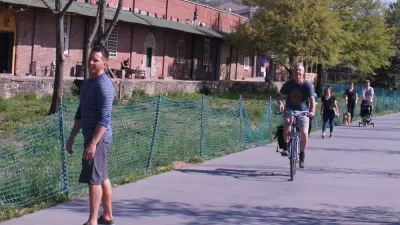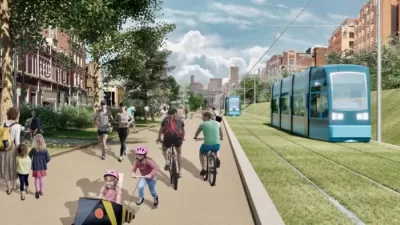The tax allocation district set up to capture development value created by the Atlanta BeltLine has fallen short of its intended goals for creating and preserving affordable housing.
Emily Nonko reports on efforts to ensure equitable development around the Atlanta BeltLine—one of the largest and most ambitious public open space investments in the United States.
While the BeltLine has already proven immensely popular, questions about equity, gentrification, and displacement have dogged the project for years now, especially in the tax allocation district set up to fund affordable housing projects. As Nonko notes, "in 2016, the BeltLine’s original visionary resigned from the partnership’s board, citing concerns about equitable development. Last year, a report from the Atlanta Journal-Constitution and Georgia News Lab found only 785 of the 5,600 units had been funded, reporting that the 'mission of keeping black families and middle and low-income residents from being pushed from their neighborhoods became an afterthought to building parks and trails.'"
Nonko reports that Atlanta BeltLine Inc. is working to better achieve goals of equity and ensuring inclusive developments within the tax allocation district. To that end, the organization recently released a report [pdf] on the subject of creating and preserving affordable housing. The report sets a goal of 5,600 affordable units. Nonko reports on the details of the report, and the challenges facing Atlanta BeltLine Inc. in achieving the ambitions of the tax allocation district.
FULL STORY: Resetting The Atlanta BeltLine’s Focus on Equitable Development

Maui's Vacation Rental Debate Turns Ugly
Verbal attacks, misinformation campaigns and fistfights plague a high-stakes debate to convert thousands of vacation rentals into long-term housing.

Planetizen Federal Action Tracker
A weekly monitor of how Trump’s orders and actions are impacting planners and planning in America.

In Urban Planning, AI Prompting Could be the New Design Thinking
Creativity has long been key to great urban design. What if we see AI as our new creative partner?

How Trump's HUD Budget Proposal Would Harm Homelessness Response
Experts say the change to the HUD budget would make it more difficult to identify people who are homeless and connect them with services, and to prevent homelessness.

The Vast Potential of the Right-of-Way
One writer argues that the space between two building faces is the most important element of the built environment.

Florida Seniors Face Rising Homelessness Risk
High housing costs are pushing more seniors, many of them on a fixed income, into homelessness.
Urban Design for Planners 1: Software Tools
This six-course series explores essential urban design concepts using open source software and equips planners with the tools they need to participate fully in the urban design process.
Planning for Universal Design
Learn the tools for implementing Universal Design in planning regulations.
Gallatin County Department of Planning & Community Development
Heyer Gruel & Associates PA
JM Goldson LLC
City of Camden Redevelopment Agency
City of Astoria
Transportation Research & Education Center (TREC) at Portland State University
Jefferson Parish Government
Camden Redevelopment Agency
City of Claremont





























